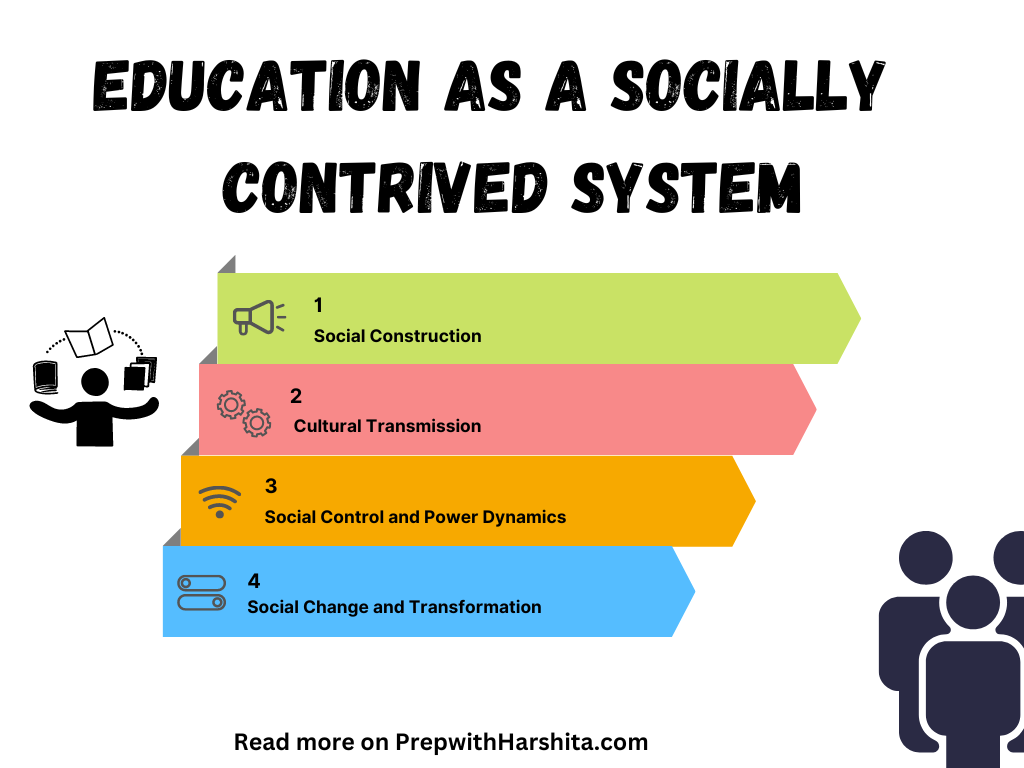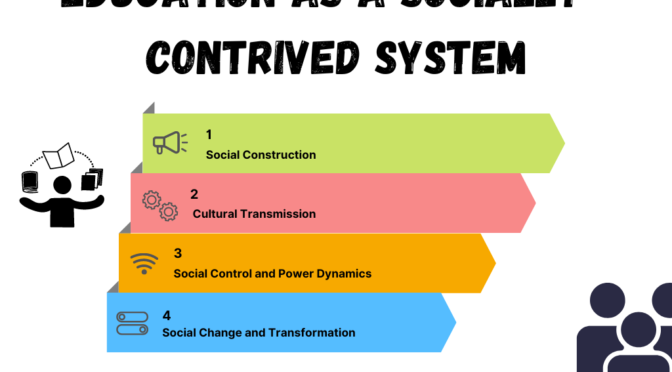Education is a socially contrived system that encompasses various processes, structures, and institutions designed to transmit knowledge, skills, values, and norms from one generation to another. It is a fundamental aspect of society, deeply influenced by cultural, economic, political, and historical factors.
The purpose of education extends beyond the mere acquisition of knowledge; it also serves to shape individuals, socialize them into the existing social order, and prepare them for their roles and responsibilities within society.
Here are some key points that illustrate education as a socially contrived system in more detail:
- Social Construction: Education is not a natural or innate phenomenon but rather a product of human design and societal needs. It is constructed by societies to fulfill specific goals and objectives deemed necessary for the well-being and progress of the community. The content, structure, and methods of education are all socially determined.
- Cultural Transmission: One of the primary functions of education is to transmit the culture, values, and beliefs of a society from one generation to the next. Through education, individuals learn about their cultural heritage, traditions, and societal norms, which helps maintain social cohesion and continuity.
- Socialization and Role Reproduction: Education plays a crucial role in socializing individuals into the existing social order. It teaches children and young adults the expected behaviors, roles, and responsibilities associated with their social positions. By internalizing these norms and values, individuals learn to conform to societal expectations and contribute to the functioning of the social system.
- Social Control and Power Dynamics: Education is a powerful tool for social control and maintaining power differentials within a society. The curriculum, teaching methods, and assessment practices can reflect and reinforce existing social hierarchies, perpetuating inequalities based on race, class, gender, and other factors. The dominant groups in society often have the ability to shape the educational system to serve their interests and maintain their privileged positions.
- Institutionalization: Education is institutionalized through schools, colleges, universities, and other formal educational settings. These institutions establish the rules, regulations, and processes that govern education, creating a standardized framework for teaching and learning. The institutionalization of education reinforces its status as a socially organized system.
- Credentialing and Sorting: Education serves as a means of credentialing individuals and sorting them into various social and economic roles. Degrees, diplomas, and certifications obtained through education act as signals to employers and society, indicating a person’s level of knowledge, skills, and qualifications. This process can contribute to social mobility or further entrench existing social inequalities.
- Social Change and Transformation: While education often reflects the existing social order, it can also be a catalyst for social change and transformation. Through critical thinking, exposure to diverse perspectives, and the acquisition of new knowledge, education can challenge prevailing beliefs, norms, and power structures. Educational movements and reforms have historically played significant roles in advancing social justice, equality, and human rights.
It’s important to note that while education is a socially contrived system, it is not a monolithic entity. It varies across different societies, cultures, and historical periods. The goals, content, and methods of education can differ significantly based on local contexts, values, and priorities.
Also Read: Gender Bias

Also Visit: Prep with Harshita

